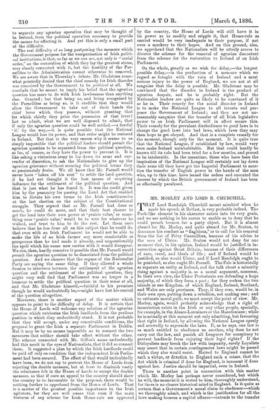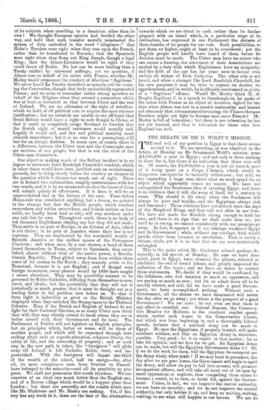MR. MORLEY AND LORD R. CHURCHILL.
THAT Lord Randolph Churchill meant mischief when he made his speech at Belfast, is very probable indeed. The Puck-like element in his character enters into its very grain, and we see nothing in his career to enable us to deny that he could preach treason for a party object. But it is almost absurd for Mr. Morley, and quite absurd for Mr. Sexton, to denounce his conduct as "flagitious," or to call for his removal from the list of Privy Councillors, because of his advice to the men of Ulster. Mr. Sexton would not deny for one moment that, in his opinion, Ireland would be justified in in- surrection against Great Britain, because of their differences of race, creed, and ideals of life ; and if Ireland would be justified, so also would Ulster, and if Lord Randolph ought to be punished, so also ought Mr. Parnell. The Pale is historically as separate an entity as Ireland, and the talk about a minority rising against a majority is, as a moral argument, nonsense. In their own view, the Ulster Protestants are defending a huge majority, of which they form a part ; for they reckon the two islands as one Kingdom, of which England, Ireland, Scotland, and Wales are only provinces. They, if they rose, would be, in their own eyes, putting down a rebellion, not making one ; and to estimate moral guilt, we must accept the point of view. Mr. Morley, again, would probably acknowledge that a right of insurrection exists in the Irish or any other people, specially, for example, in the Alsace-Lorrainers or the Macedonians ; while he is actually at this moment not only admitting, but favouring that right in Ireland, by allowing the National League openly and avowedly to supersede the laws. If, as he says, one law is as much entitled to obedience as another, why does he not carry out the law, and punish all Leaguers for conspiracy to prevent landlords from enjoying their legal rights? If the Disloyalista may break the law with impunity, surely Loyalists may assert that in certain contingencies laws might be passed which they also would resist. Hatred to England cannot be such a virtue, or devotion to England such a crime, that the Act which is criminal if done for England, is innocent if done against her. Justice should be impartial, even in Ireland.
There is another point in connection with this matter which Mr. Morley has perhaps never considered, but which he will, the moment it is stated to him, thoroughly understand, for there is no clearer historical mind in England. Is it quite so certain that .a Government's moral claim to obedience—which we thoroughly admit, and which is the justification for all the laws making treason a capital offence—extends to the transfer
of its subjects, when unwilling, to a dominion other than its own ? We thought European opinion had decided the other way, and held that such transfer morally terminated the system of duty embodied in the word " allegiance ;" that Hofer's Tyrolese were right when they rose upon the French, rather than be transferred to Bavaria; that the Spaniards were right when they flung out King Joseph, though a legal King ; that the Alsace-Lorrainers would be right if they could throw off Berlin. No law can be more binding than a Treaty ratified by universal suffrage, yet we question, if Alsace rose on behalf of its union with France, whether Mr. Morley would pronounce the conduct of Alsatians "flagitious." We never beard La Vendee described as morally evil for resist- ing the Convention, though that body undoubtedly represented France ; and we seem to remember rather strong speeches on behalf of the Belgians when they severed a connection which was at least as historical as that between Ulster and the rest of Ireland. We are no advocates of the right of rebellion, which we hold, of all political acts, to require the most extreme justification ; but we certainly are unable to say off-hand that Great Britain would have a right to cede Bengal to China, or that it could so completely assign Scotland to Sweden that the Scotch right of armed resistance would morally end. Legally it would end, and law and political morality must coincide somewhere ; but it is no case for a peremptory, still less for an abrupt, decision. In many eyes, of course, there is a difference, because the Ulster men and the Connaught men are sections of one people, but that is not the view of the Ulster men themselves.
Our object in making much of the Belfast incident is in no degree to extenuate Lord Randolph Churchill's conduct, which in other times would have been justified only on revolutionary grounds, but to bring clearly before the country an element in the question which it thrusts too much out of sight. There are in Ireland two nationalities, roughly conterminous with her two creeds, and it is by no means certain that the lesser of them will submit quietly to effacement. If it does, it will be an unprecedented fact in the history of the race. Years before Home-rule was considered anything but a dream, we pointed to the strange fact that the British people, which wanders everywhere and settles everywhere, and founds nations as bees settle, we hardly know how or why, will stay nowhere under any rule but its own. Throughout earth there is no body of ten thousand Englishmen obeying any law they did not make. They settle in no part of Europe, in no division of Asia, which is not theirs ; in no part of America where their law is not supreme. They are unattracted by the wonderful wealth of Spanish America or the endless spaces of the Portuguese dominion ; and when once, by a rare chance, a band of them found themselves in Texas, subject to Spaniards, they estab- lished, almost without trial of the native power, a Revolu- tionary Republic. They glided away from Java within three years of its cession to the Dutch ; they scarcely settle in the Transvaal, because it is not English ; and if Bengal were foreign to-morrow, every planter would by 1890 have sought a career elsewhere. They may by possibility consent to be governed by Keltic Catholics, differing from themselves in race, creed, and ideals ; but the probability that they will not is historically so much greater, that it must be thought out as a leading factor in the problem now before us. To shut it from sight is imbecility as great as the British Ministry displayed when they extended the Stamp-taxes to the Thirteen Colonies. Even if the Scotch and English of Ireland do not fight for their Cantonal liberties, as so many Ulster men think they will, they may silently retreat to lands where they are in better accord with their Government and its laws. The Parliament of Dublin will not legislate on English principles, but on principles which, better or worse, will be those of another people, and which will be expressed through laws seeking other ends as regards education, religions liberty, the safety of life, and the ownership of property ; and as each step in the new path is taken, the " foreigners " will glide away till Ireland is left Catholic, Belli; inert, and im- poverished. With the foreigners will depart one-third of the wealth of the island, half its energy—for, after all, its most conspicuous men, from Grattan to Parnell. have belonged to the minority—and all its proclivity to pro- gress. We shall not pronounce this result injurious. We can conceive of an ideal very much better than the English one, and of a Breton village which would be a happier place than London ; but these are assuredly not the results which men like Mr. Gladstone and Mr. Morley are seeking. Yet, if his- tory has any truth in it, these are the best of the alternatives
towards which we are about to rush, rather than be farther plagued with an island which, in a particular stage of its civilisation, has expressed in one Parliament the distaste of three-fourths of its people for our rule. Such possibilities, to put them no higher, ought at least to be considered ; yet the English people will hardly have heard of them before its decision must be made. The Ulster men have no orator who can secure a hearing, the utterances of their Associations are spoiled by a fury with which Englishmen have no sympathy, and the drift of the age has for years been to favour even unduly all wishes of Irish Catholics. The other aide is not heard, and when a stranger like Lord Randolph Churchill, for his own purposes it may be, tries to express its doubts, its apprehensions, and its wrath, he is officially condemned as guilty of a " flagitious " offence. Would Mr. Morley think M. de Broglie flagitious if, in a speech to Strasburghers, he spoke of the union with France as an object of devotion, sighed for the days when Alsace was lost in a greater nationality, and hinted not obscurely that, circumstances favouring, the Franco-German Province might yet fight to become once more French? Mr. Morley is full of toleration ; but there is one toleration he has not yet learned, and that is toleration for those who love England too well.



































 Previous page
Previous page